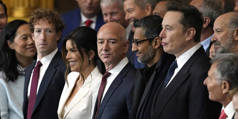Oligarchy in America

Though Donald Trump attracted more support than ever from working-class voters in the 2024 US presidential election, he has long embraced an agenda that benefits the wealthiest Americans above all. During his second term, however, Trump seems committed not just to serving America’s ultra-rich, but to letting them wield state power themselves.

Escaping the New Gilded Age
BOSTON – Tech billionaires such as Bill Gates, Mark Zuckerberg, and Elon Musk are not just among the richest people in human history. They also are exceptionally powerful – socially, culturally, and politically. While this is partly a reflection of the social status that our society attaches to wealth in general, that is not the whole story.
What matters even more than simple wealth is that these particular billionaires are viewed as entrepreneurial geniuses who exhibit unique levels of creativity, daring, foresight, and expertise on a wide range of topics. Add the fact that many of them control major means of communication – namely, the key social-media platforms – and you have something almost unparalleled in recent history.
The image of the rich, brave businessman who transforms the world can be traced back at least to the robber barons of the Gilded Age. But one of the main sources of its contemporary popular appeal is Ayn Rand’s novel Atlas Shrugged, whose protagonist, John Galt, strives to re-create capitalism through the sheer force of his idealism and will.
While Rand’s novel has long held canonical status in the minds of Silicon Valley entrepreneurs and libertarian-leaning politicians, the influence of its central archetype is hardly confined to those circles. From Bruce Wayne (Batman) and Tony Stark (Iron Man) to Darius Tanz in the TV series Salvation, rich, technologically savvy innovators who save the world from impending disaster are a staple of our popular culture.
The Power of the Purse
Some individuals will always have more power than others, but how much power is too much? Once upon a time, power was linked to physical strength or military prowess, whereas now its perquisites usually stem from what Simon Johnson and I call “persuasion power,” which, as we explain in our book Power and Progress, is rooted in status or prestige. The greater your status, the more easily you can persuade others.
The sources of status vary greatly across societies, as does the extent to which it is unequally distributed. In the United States, status became firmly linked to money and wealth during the Industrial Revolution, and income and wealth inequality skyrocketed as a result. While there have been periods in which government intervention sought to reverse the trend, American society has always been structured around a steep status hierarchy.
This structure is problematic for several reasons. For starters, the constant competition for status – and the persuasion power it confers – is largely a zero-sum affair, because status is a “positional good.” More status for you means less status for your neighbor, and a steeper status hierarchy implies that some people will be happy while many others are unhappy and dissatisfied.
Moreover, investments in zero-sum activities tend to be inefficient and excessive compared to investments in non-zero-sum activities. Is it better to spend a million dollars on gold Rolex watches or on learning new skills?
Both may have intrinsic value – the beauty of the watch versus the pride of acquiring new knowledge – but the first investment merely signals that you are richer and more capable of conspicuous consumption than others. The second, by contrast, increases your human capital and may also contribute to society. The first is largely zero-sum, and the second is largely non-zero-sum. Worse, the first can easily get out of hand as everyone spends even more on conspicuous consumption to stay ahead of others.
Commentators often ask why someone with hundreds of millions of dollars would ever need hundreds of millions more. There are few things that you cannot afford if you already have $500 million, so why long for $1 billion? Because “billionaire” is a rank of status. What matters is not the spending power but the prestige and power that it confers relative to one’s peers. Under a “wealth-is-status” equilibrium, a mad dash by the ultra-wealthy to amass ever more wealth becomes inevitable.
The Dictatorship of Dilettantism
There are both evolutionary and social bases for linking persuasion power to status and prestige. After all, it is individually rational to learn from people who have expertise, and it is reasonable to link expertise to success.
Moreover, this form of learning is good for communities, because it facilitates coordination and a convergence toward best practices. But when status is linked to wealth, and wealth inequality grows very large, the foundation underpinning expertise starts to crumble.
Consider the following thought experiment. Who has greater expertise on carpentry – a good, master carpenter or a hedge-fund billionaire? It seems natural to choose the former; but the more that wealth confers status, the greater the weight attached to hedge-fund billionaires’ views, even on carpentry. Or consider a more relevant contemporary example. Whose views on freedom of speech carry more weight today, a tech billionaire or a philosopher who has long grappled with the issue, and whose evidence and arguments have been subjected to scrutiny by other qualified experts? Millions of people on X (Twitter) have implicitly chosen the former.
The deeper we are drawn into the “wealth-is-status” equilibrium, the more we may come to accept the supremacy of tech billionaires. Yet it is difficult to believe that wealth could be a perfect measure of merit or wisdom, let alone a useful proxy for authority on carpentry or freedom of speech. Moreover, wealth is always somewhat arbitrary. We can argue endlessly about whether LeBron James is better than Wilt Chamberlain was at the peak of his basketball career, but in terms of wealth, there is no contest. While Chamberlain had an estimated net worth of $10 million at the time of his death in 1999, James’s net worth is estimated at $1.2 billion.
These different outcomes are not about each player’s respective talent or work ethic. Rather, Chamberlain happened to live at a time when sports stars were not compensated as much as they are today. This is partly about technology (everybody can watch James today thanks to TV and digital media), partly about norms (paying hundreds of millions to cultural superstars has become more acceptable), and partly about taxes (if the US still had a top marginal income tax rate above 90%, James would have less money, and the country would have less wealth inequality).
Similarly, if the tech sector had not become so central to the economy, and if it was not driven by such strong winner-take-all dynamics (which is partly a matter of choice about how we organize certain markets), today’s tech tycoons would not have become so rich. The fact that Gates and Musk have been taxed less does not make them any wiser, but it certainly has made them wealthier, and thus more influential under the prevailing “wealth-is-status” equilibrium.
Power Corrupts
Such figures also benefit from an even more pernicious dynamic that Johnson and I explore in Power and Progress, using the example of Ferdinand de Lesseps. Lesseps gained tremendous status in late-nineteenth-century France, where he was known as “Le Grand Français,” owing to his success in completing the construction of the Suez Canal in the face of longstanding British opposition to the project.
Lesseps had foresight, and he demonstrated great skill in convincing politicians in Egypt and France that maritime international trade would become very important. But he was also tremendously lucky: the hoped-for technologies that he needed to build the canal without locks (which was initially impossible because of the amount of excavation and digging involved) were developed just in time to save the project.
With his Suez victory, Lesseps gained great prestige. But what he did with his new status is instructive. He became reckless, unhinged, and cocky, pushing the Panama Canal project in an unworkable direction that ultimately led to the deaths of more than 20,000 people and the financial ruin of many more (including his own family). Like all forms of power, persuasion power can make one hubristic, unrestrained, disruptive, and socially obnoxious.
Lesseps’s story remains relevant, because it clearly has echoes in the behavior of many billionaires today. While some of America’s wealthiest individuals do not use their wealth-derived status to influence critical public debates (think Warren Buffett), many do. Gates, Musk, George Soros, and others do not hesitate to weigh in on matters that are important to them, and while it is easy to welcome such contributions from those whom we agree with, we should resist this temptation. It makes a lot of sense for society to tap into the knowledge and wisdom of those with expertise on a given topic, but it is counterproductive to amplify the status of those who already have plenty of status (and are working very hard to increase it).
Another Way
Of course, it is not entirely billionaires’ fault that US policy is fueling massive inequality (though they certainly lobby for policies that have this effect). They should, however, bear responsibility if they misuse the immense status that wealth affords them under conditions of rising inequality. That is especially true when they leverage their status to advance their own economic interest at the expense of others’, or to polarize an already divided society with provocative rhetoric or status-seeking behavior.
If unaccountable billionaires already wield too much undue social, cultural, and political influence, the last thing we should want is to give them even bigger public forums – for example, in the form of their own social network as Musk now has through his ownership of X. Instead, we should pursue stronger institutional means of limiting the power and influence of those who are already privileged, as well as reconsider the tax, regulatory, and spending policies that created such massive disparities in the first place.
But the most important step will also be the most difficult. We need to start having a serious conversation about what we should value, and how we can recognize and reward the contributions of those who do not command vast fortunes. While most people would agree that there are many ways to contribute to society, and that excelling in one’s chosen vocation ought to be a source of individual satisfaction and the esteem of others, we have disregarded this principle, and are at risk of forgetting it altogether. That, too, is a symptom of the problem.

American Idiots
With Donald Trump, Elon Musk, and J.D. Vance’s sudden decision to sabotage a routine bill intended to keep the US government running, the world has gotten a preview of US politics for the next few years. Grandstanding and performative gestures, not sound policy and basic competence, will be reflected in all decisions.
BERKELEY – The threat of a Christmastime government shutdown sparked by America’s chief Scrooges, Elon Musk, Donald Trump, and J.D. Vance, has been narrowly averted. Nonetheless, it is worth reviewing what happened, because the episode perfectly foreshadows the dysfunctional governance that awaits the United States (and the world) when Trump takes office in January.
On the eve of the December 20 deadline for passing a bill to keep the federal government funded, the US House and Senate leadership arrived at a compromise that would buy them another three months. Neither party was particularly happy with the deal, but all could live with it. They had the votes to pass it, and President Joe Biden’s staff was willing to put it in front of him for his signature.
But then Musk went berserk, fueling a “backlash” to the stopgap bill with “false and misleading claims,” as Politico put it, and stirring “Republicans into a frenzy with 100-plus posts on X.” Among his inaccuracies was that the bill would fund the development of biological weapons, when in fact it would fund labs where any future plague could be contained and studied. (We should not forget that COVID-19 was not nearly as infectious or deadly as, say, Ebola; we cannot count on being so lucky next time.)
Musk also falsely claimed that each member of Congress would get a 40% pay raise, when in fact they are scheduled to get a 3.8% cost-of-living bump regardless of the bill under consideration. According to Musk, the bill contained a $3 billion subsidy for a new stadium for the Washington Commanders (NFL football), when in fact it would transfer the site of RFK Stadium – where no NFL team plays or has plans to play – to the District of Columbia government so that the site can be redeveloped.
These are just a few of Musk’s many falsehoods. They were plain as day, and yet Musk succeeded in intimidating Republicans with hispromise that “any member of the House or Senate who votes for this outrageous spending bill deserves to be voted out in 2 years!” Instead of pointing out that Musk does not know what he is talking about, Republicans fell into line.
According to what GOP representatives were saying as of the morning of December 18, Trump himself had no problem with the bill. Yet by that afternoon, he and Vance had gone on the offensive,callingcongressional Republicans “foolish and inept” for “allowing our country to hit the debt ceiling in 2025.” Now, theymust pass a “temporary funding bill WITHOUT DEMOCRAT GIVEAWAYS combined with an increase in the debt ceiling. Anything else is a betrayal of our country.”
In any case, as of December 19, the Democratic leadership in the House no longer knew who was in charge and who they were supposed to be negotiating with. Is Mike Johnson really the Speaker of the House,asked Jamie Raskin, “Or is it Donald Trump? Or is it Elon Musk? Or is it somebody else?” (In fact, Senator Rand Paulfloated the ideaof installing Musk as Speaker.)
In the end, Johnson and House Minority Leader Hakeem Jeffries cobbled together a last-minute deal that includes substantial policy concessions to Democrats and no increase to the debt limit, an outcome that amounted to a policy defeat for Trump, Musk, and Vance. But they won’t care, because policy does not concern them. Trump and the incoming Republican congressional majorities know they have the fervent support of predominantly low-information – or downright misinformed– voters. And those voters won’t care (or even know) that more Democrats than Republicans voted for Johnson’s House bill (prompting Musk to ask, “So is this a Republican bill or a Democrat bill?”).
Such is the state of American politics and governance today. It now channels the performative style of professional wrestling. The basic democratic decision loop – in which voters elect officeholders who devise policies with effects that inform the outcome of subsequent elections – is now totally broken.
There will be consequences, though, and it is not entirely clear that Trump, Musk, and Vance have factored them into their calculus. AsPaul Krugmanpoints out, “since the election financial markets have clearly been betting that Trump will do very little of what he promised during the campaign … discount[ing] the disastrous consequences that would follow” from trade wars, mass deportations, and so forth. But the market increasingly appears to be mistaken. An unnecessary and avoidable “government shutdown in response to completely false claims about what’s in an innocuous short-term funding measure suggests that the peddlers of misinformation are high on their own supply.”
Could Republican legislators regain the ability to communicate with their own political base? Could Democrats win durable, substantial legislative majorities in the 2026 midterm elections? Anything is possible, but I’m not betting on it. There is every reason to expect America’s largely broken federal government to do immense damage to the country – and Trump hasn’t even taken office yet.

The End of Progress?
NEW YORK – Thirty-five years ago, the world experienced an epochal change with the collapse of European communism. Francis Fukuyama famously called this moment the “end of history,” predicting that all societies would eventually converge toward liberal democracy and market economies. Today, it is almost a cliché to observe how wrong that prediction was. With the return of Donald Trump and his MAGA movement, perhaps we should call the current era the “end of progress.”
Most of us take progress for granted. But we should remember that living standards 250 years ago were little different from what they were 2,500 years ago. Not until the Enlightenment and the Industrial Revolution did we achieve the enormous improvements in life expectancy, health, and living standards that have defined modernity.
Enlightenment thinkers recognized that scientific experimentation and tinkering could help people understand nature and create new, transformative technologies; and that the social sciences could enable closer coordination in efforts to improve conditions for all members of society. Such efforts required the rule of law to displace absolutism, respect for truth to prevail over obscurantism, and the elevation of expertise in human affairs. Among the most disturbing features of the MAGA revolution is its outright rejection of these values.
Can progress continue? Just as the Soviets managed to launch Sputnik, we may see Trump and his followers preside over notable technological feats in space and artificial intelligence. But can we really expect America’s new oligarchy to oversee sustained, widely shared advances? Those in power now are driven wholly by the pursuit of wealth, and they have no reservations about accumulating it through exploitation and rent-seeking. They have already demonstrated their ingenuity in wielding market power and leveraging media and technology platforms to advance their private interests through widespread manipulation and disinformation.
What differentiates today’s American-style corruption from past forms is its sheer scale and brazenness. The idea of stuffing $100 bills into brown paper envelopes sounds quaint compared to what we have now. American oligarchs can openly “contribute” hundreds of millions of dollars to a politician’s election campaign in exchange for favors. The$465 million no-strings-attached loan that Tesla received from President Barack Obama’s administration 15 years ago will look like a pittance compared to what is coming down the pike.
Progress requires investments in basic science and an educated labor force. Yet during his first term, Trump proposed such massive cuts in funding for research that even his fellow Republicans balked. Will they show the same willingness to resist him this time?
In any case, is progress still possible when the institutions responsible for the advancement and transmission of knowledge are under constant attack? The MAGA movement would like nothing more than to tear down the “elite” institutions where so much cutting-edge research occurs.
No country can truly prosper if large portions of the population suffer from deficiencies in education, health, and nutritious food. In America, around16%of children grow up in poverty, overall performance in international educational assessments is mediocre, malnutritionand homelessness have become pervasive, andlife expectancyis the lowest of any major advanced economy. The only remedy is more and better public spending. Yet Trump and his team of oligarchs are committed to cutting the budget as much as they can. Doing so would leave the United States even more dependent on foreign labor. But immigrants, even highly skilled ones, areanathemato Trump’s MAGA followers.
Although the US has long led the world in advancing basic science and technology, it is hard to see how this can continue under Trump. I see three possible scenarios. In the first, the US finally comes to terms with its deep-seated problems, rejects the MAGA movement, and reaffirms its commitment to Enlightenment values. In the second, the US and China continue down the road to oligarchic capitalism and authoritarian state capitalism, respectively, with the rest of the world lagging behind. Lastly, the US and China stay on their course, but Europe takes up the banner of progressive capitalism and social democracy.
Unfortunately, the second scenario is most likely, which means we must consider how long America’s growing deficiencies will remain manageable. China has massive advantages in developing technology and AI, owing to its huge market, vast supply of engineers, and commitment to long-term planning and comprehensive surveillance. Moreover, China’s diplomacy vis-à-vis the 60% of countries outside the West has been far more successful than America’s. But, of course, neither China nor a Trumpian America is committed to the values that have driven progress since the late eighteenth century.
Tragically, humanity is already grappling with existential challenges. Advances in technology have given us the means to destroy ourselves, and the best way to prevent that is through international law. In addition to the threats posed by climate change and pandemics, now we also have to worry about unregulated AI.
Some will counter that while there may be a pause in progress, past investments in basic science will continue to yield valuable returns. Besides, the optimists might add, every dictatorship eventually ends, and history moves on. A century ago, fascism engulfed the world. But that led to a wave of democratization, with decolonization and civil-rights movements countering racial, ethnic, and gender discrimination.
The problem is that those successful movements went only so far, and time is not on our side. Climate change will not wait for us to get our act together. Will Americans enjoy continued progress in the form of shared prosperity, based on education, health, safety, community, and a clean environment? I doubt it. And will the end of progress in America have knock-on effects globally? Almost surely.
It is too soon to know what the full consequences of Trump’s second presidency will be. History does indeed move on; but it could leave progress behind.

The New Washington Consensus
NEW YORK – For decades, we have been told that government-operated businesses are bad for the economy. A staple of the “Washington Consensus” that emerged in the 1980s was that “private industry is managed more efficiently than state enterprises,” because the threat of bankruptcy keeps managers in private companies focused on the bottom line. Originally formulated for countries in Latin America and then applied during the post-communist transition in Central and Eastern Europe, the Washington Consensus has been the dominant economic policy paradigm ever since.
But what happens when businesspeople are in government? What does it mean for people’s ability to set the rules by which they are governed? Such questions are rarely asked, because bringing experienced entrepreneurs into government is reflexively celebrated. They supposedly know how to run things efficiently, and their involvement is usually ad hoc. But while recruiting individual entrepreneurs into government is one thing, Donald Trump’s administration appears intent on handing over the entire government to businesspeople.
To be sure, positioning yet anotherfinancial tycoon, Scott Bessent, as Secretary of the Treasury is no surprise, given the long list of predecessors with similar backgrounds. Likewise, the rollback of antitrust enforcement and environmental and financial regulation is familiar from previous Republican administrations, often with bad long-term results – from the 2008 financial crisis to increasingly frequent and severe fires, heat waves, and ice storms.
But the second Trump administration is going much further. If a picture is worth a thousand words, the image of Big Tech founders and CEOs (including from Amazon, Meta, and X) filling the front row at Trump’s inauguration is a manifesto. They were given priority even over the president’s cabinet nominees. While Big Oil and the finance industry were slightly less visible, their shadows also loomed large.
These images sent a message stronger than any verbal statement: not only is this US government “good for business”; it is business. The old adage, “the business of America is business,” has been taken to a new extreme: the government of America is business, too. Call it the New Washington Consensus.
Of course, business has always played an outsize role in American history. A joint-stock venture, the Virginia Company, established the first permanent settlement in North America, and the Dutch West India Company controlled much of the transatlantic slave trade, building forts and settlements in the West Indies and America. More than just public-private partnerships, these entities were rulers in their own right. And the East India Company, which established British colonial rule over the Indian Subcontinent for almost a century, even asserted its own sovereign power over territories it had conquered. (Though the Company’s Warren Hastings, who had been appointed governor-general of British India, was impeached for this power grab, he was ultimately acquitted.)
Historysuggests that a “company-state” is at best a mixed blessing. The logic of business leaves little room for freedom unless you are one of the few at the top. Business allows for only two types of humans: workers and consumers – the former as inputs for production, the latter as buyers of products or services. In both cases, people’s only purpose is to help maximize shareholder value.
Thus, labor costs must be kept down, and demand must be kept high, by whatever means available. There is no place for loyalty, community, or individual rights. Top managers in the United States may get golden handshakes (large payouts) when they leave, but workers can be fired at will. Consumers are portrayed as the lucky ones whose lives are enriched by purchasing products they crave – even when those products sicken or kill them, as in the case of tobacco or alcohol.
The model of boosting profits through addiction has been perfected by today’s big digital companies. The dopamine-boosting “likes,” endless scrolling, and algorithms that make posts go viral all ensure that quitting causes distress akin to drug withdrawal. There are no checks and balances, no mechanisms of accountability, and no defenses against intrusions into one’s personal life. A simple click upon signing up submits millions of people to private autocracy. And make no mistake: autocracy is what we are dealing with. Markets may be about bargaining among free and equal parties, but firms, as Ronald Coasetaught us, are about central control.
Private islands of corporate autocracy have always been in tension with democratic self-governance, and the fate of past company-states suggests that this time it might not end well either. Rebellions and mutinies against the East India Company led British rulers to assert direct control over the subcontinent, and eventually to dissolve the company. Elsewhere, colonial companies often governed ruthlessly, hiding behind legal protections that shielded them from responsibility before succumbing to excessive debt burdens or mismanagement. In North America, the colonial companies’ charters were gradually transformed into proto-constitutions that limited executive power and gave voting power to the people.
Keeping business out of government is becoming more and more difficult, and not just in the US. The prospect of eliminating controls on private power by seeking public power is too tempting for business leaders with sufficient time and money. Now that we have watched business take over government in broad daylight, the only alternatives are to democratize business or abandon any pretense of democracy.
EL ENLACE A LA NOTA EN PROJECT SYNDICATE: https://www.project-syndicate.org/onpoint/oligarchy-in-america?utm_source=Project+Syndicate+Newsletter&utm_campaign=fbf8054777-op_newsletter_01_31_2025&utm_medium=email&utm_term=0_73bad5b7d8-fbf8054777-93502913&mc_cid=fbf8054777&mc_eid=ec850c2b29
If there were any doubts that Donald Trump’s second presidency would bring a lurch toward oligarchy in the United States, the front row at his inauguration – comprising a veritable who’s who of Silicon Valley titans and other business elites – laid them to rest. If personnel is policy, Trump’s cabinet nominees, White House appointments, and purges of executive branch agencies makes it clear whom his administration intends to serve.
Trump’s voters – even those who bought his populist message – don’t have a problem with this, because, as Nobel laureate Daron Acemoglu explains,the billionaires the president is tapping are “viewed as entrepreneurial geniuses who exhibit unique levels of creativity, daring, foresight, and expertise on a wide range of topics.” But it “should be obvious that wealth is a poor metric for wisdom.”
Trump’s richest backer, Elon Musk, is Exhibit A. As J. Bradford DeLong of the University of California, Berkeley, observes, Musk demonstrated his lack of wisdom even before the inauguration, when he helped to “sabotage a routine bill intended to keep the US government running,” an episode that “foreshadows the dysfunctional governance” that Trump’s cronyism implies.
Nobel laureate Joseph E. Stiglitz fears an even worse outcome, because so many in Trump’s orbit reject the “Enlightenment values” that have driven improvements in life expectancy, health, and living standards since the late eighteenth century. The US has “long led the world” in advancing basic science and technology, but can we really expect America’s “ascendant oligarchy” – which is “driven wholly the pursuit of wealth” – to “oversee sustained, widely shared advances?”
By “handing over the entire government to businesspeople,” Columbia Law School’s Katharina Pistor concludes, the Trump administration is taking the Washington Consensus – which assumes that private industry is managed more efficiently than state enterprises – to the next level. But Trump’s working-class voters should beware: according to the “logic of business,” people’s only purpose is to “help maximize shareholder value.” Unless you are “one of the few at the top,” you will find “little room for freedom.”